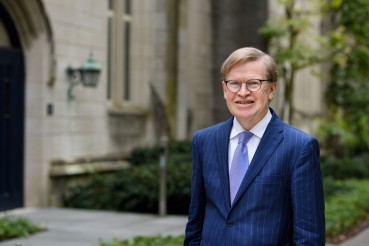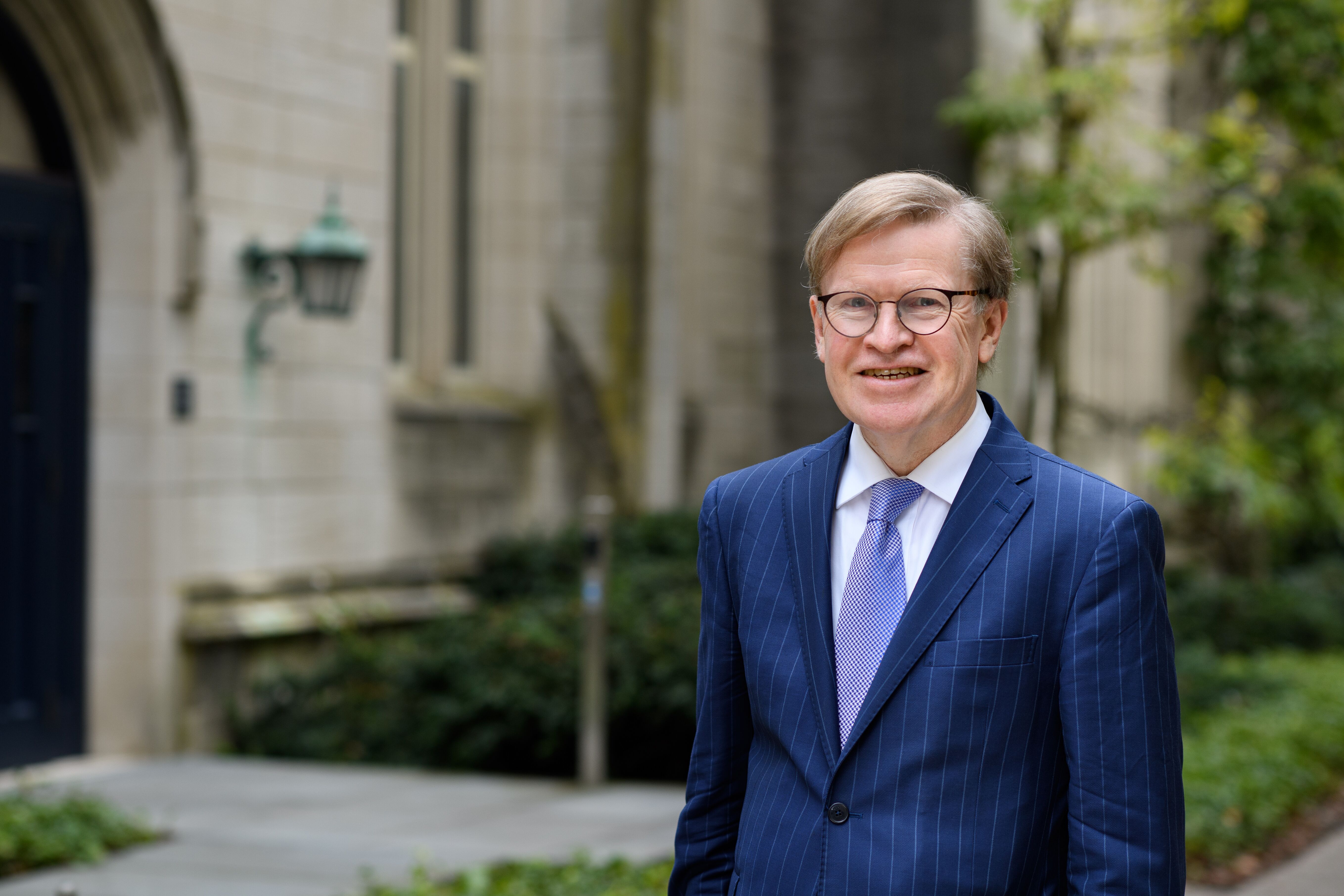Russia is too small to win the war in Ukraine
Category: Macroeconomics

Prof. Harold James (photo source: author's archive)
There are many historical precedents of such a reorientation of conflict. Faced by stalemate in the great wars of the twentieth century, wartime leaders tried both to extend the war to include an attack on domestic order, and to expand the conflict geographically. When Germany faced a stalemate in the First World War, it tried to dismantle its opponents from within, by sending Irish nationalists to unleash the Easter Rebellion in 1916, and most famously by allowing Lenin and his comrades to transit from Switzerland to Finland in 1917. The German leadership also responded to the stalemate by starting the unconditional submarine warfare against the United States in 1917. There were parallel initiatives in the Second World War, German attempts to subvert the British empire, as well as the extension of the war to the Soviet Union after the attempt to destroy Britain failed in 1940, and then in December 1941 the declaration of war on the United States after Operation Barbarossa had become bogged down.
The Russian calculation is that rich industrial countries cannot bear the hardships brought by higher fuel and food prices and the reduced effective incomes. The current equivalent is the calculation that worldwide hunger will trigger political unrest in food dependent and vulnerable countries in the Middle East. That would provoke a new wave of refugees, and the disrupted lives of miserable and starving people would then be used as a human weapon against the West to heighten disruption and conflict. That playbook was already used in Syria in 2015 to heighten strains and tensions in Europe. Food is as vital a weapon as energy.
Russia’s main tool in the battle against the West has become inflation. Inflation is often the consequence of fighting wars, and there are clear historical precedents of how inflation breaks up political systems. In federal structures, such as Germany in the early 1920s, or the Soviet Union and the Yugoslav federation in the late 1980s, inflation led to a centrifugal dynamic and separatism. The constant suspicion was that the center, Berlin, Moscow or Belgrade, exercised a tightly unfair political control over the distributive levers. For the regions, separation and monetary autonomy becomes ever more attractive.
Inflation, the measure of a fever curve of uncertainty, destroys large and complex political entities. We know that President Putin believes that the breakup of the Soviet Union was the greatest political catastrophe of the twentieth century. Now he may believe that energy and food induced inflation – and government attempts to buffer the impact of higher prices by sending and subsidizing more – will destroy the British, the America and the European Unions.
Democracies have regular elections, so it is always easy to calculate that one victory in one country for an anti-war movement could have a demonstration effect that would precipitate the disintegration of Ukraine’s support. There were hopes in the Kremlin that Marine Le Pen would win in France. Each collapse of an anti-Putin European government is followed by Russian exultation about the disintegration of the anti-Russian bloc. Foreign Minister Sergei Lavrov noted that the toppled British Prime Minister Johnson “kept saying that Russia should be isolated, while his own party has isolated Boris Johnson himself instead.” There was a powerful Russian campaign against Bulgarian Prime Minister Kiril Petkov’s government, who termed the push “hybrid warfare.” After the resignation of Italy’s Mario Draghi, the Italian foreign minister Luigi Di Maio commented: “The Russians are right now celebrating having made another western government fall. Now I doubt we can send arms [to Ukraine]. It is one of the many serious problems.” Former Russian President Dmitri Medvedev posted on Telegram, “Johnson and Draghi are gone, who will be next?”
It is also conceivable that this strategy is augmented by the opening up of one or more new fronts, with military action in the Baltics, or against Moldavia, or in northern Kazakhstan. Any of these would be presented as a signal that Russia will not allow a defeat or an end of the war.
What if the conflict stretches out to 2024, with high inflation, an economic recession, and a savage curtailing of people’s expectations of a quick exit from the ravages of the pandemic. Would the US elections provide Russia a hope for a political solution in a Trump or a Trumpist presidency that would end the war on Russia’s terms?
All these strategies however cannot alter the fact of the increasingly evident longer term fragility of Russia. The breakdown of energy provision will only mean a quicker transition to a Europe for which Russian gas is no longer needed. The non-energy side of the Russian economy is being destroyed. Hundreds of thousands of tech savvy Russians have left their country.
Russians, including Putin, are very familiar with a history in which military defeat is followed by regime breakdown or at least the introduction of a fundamental reform. The Crimean war in the nineteenth century led to Alexander II’s reforms, and the abolition of Russia’s old system of serfdom. Defeat in the Japanese war in 1905 produced revolution and parliamentarization, the calling of the first Duma. The First World War destroyed the Tsarist empire and launched the Bolshevik Revolution. The long drawn out and unsuccessful struggle in Afghanistan was one of the precipitants of the collapse of the Soviet Union. The military stalemate, and the beginning of a successful Ukrainian counter-offensive has thus directly produced an existential question for Putin and the Russian leadership: which side will collapse first.
The article is published in a series of articles in Obserwator Finansowy written by governors of central banks and distinguished economists. The series is under the special patronage of the Governor of Narodowy Bank Polski, Professor Adam Glapiński. The authors of the articles have agreed to waive their fees for writing the texts, and in exchange NBP shall donate the amount equivalent to the fees onto the account of the National Bank of Ukraine in order to support the NBU during the war. Below is a foreword by the Governor of NBP to the whole series:
On 24 February a huge tragedy occurred, in the face of which it is impossible to simply move on as if nothing had happened.
Nobody can remain indifferent to the misfortune that has befallen the Ukrainian nation.
All of us are shocked by the press reports, and particularly by what we see in the mass media.
Fighting Ukraine is not only its brave soldiers, but also an army of thousands of civilians trying to preserve normality in a country stricken by Russian aggression.
This army includes the staff of the National Bank of Ukraine, with whom NBP is in constant contact.
Aware of our Ukrainian colleagues’ needs, we have invited several central bank governors and eminent economists to share their knowledge on the economic processes taking place around the world.
It is rare for such a distinguished group of authors to feature in Obserwator Finansowy, which is published by NBP. It is also worth underlining that all the authors have waived the fees for their articles in order to donate them to meet the needs of our colleagues working in the National Bank of Ukraine.
I believe that you will find the series of these articles interesting, especially since they not only share the knowledge and experience of their authors, but also express goodwill towards the war-afflicted NBU.
Prof. Adam Glapiński, Governor of NBP



